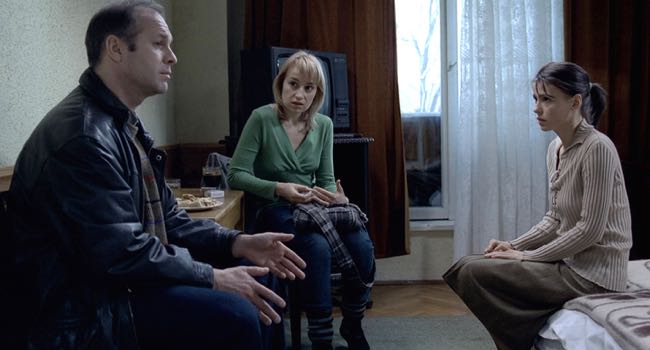By Ray Bennett
CANNES – Romanian filmmaker Cristian Mungiu’s In Competition entry “4 Months, 3 Weeks and 2 Days” is a harrowing tale of the grim lengths to which two young women will go to end an unwelcome pregnancy in a totalitarian society that is indifferent to their fate unless it involves punishing them.
Set in the shabby rooms of rundown buildings on neglected city streets, the film casts an unblinking eye on life in the last years of communism in Romania. Its story of desperation forced on two hapless youngsters indicts a regime that was as callous as it was empty. The film is dark, gloomy and without music, but also it is observant and highly suspenseful as Mungiu uses his often static camera to balance banal cruelty with simple generosity. The film, which boasts an exceptional performance by Anamaria Marinca, might not break out of the festival and art house circuit but it is likely to pick up some awards along the way.
The title describes the exact length of time that scatterbrained Gabita (Laura Vasiliu) has left things before seeking an abortion. But she lies about it not only to her considerate roommate Otilia (Marinca) but also more dangerously to the abortionist recommended by a fellow student.
Tolerant and generous, Otilia not only helps Gabita find the money for the procedure but also goes to meet the man who’s going to do the job. He’s a coolly nasty piece of work named Bebe (Vlad Ivanov) who complains about all the arrangements and describes unfeelingly just what is going to happen.
Having paid for a room in a seedy but expensive hotel and with her body clock ticking, Gabita is willing to put up with almost any indignity in order to solve her problem short of the single motherhood that would drive her to disgrace and poverty. Otilia’s willingness to help her witless friend is tested to the extreme when Bebe demands sex with both of them as a mandatory bonus. Otilia’s required visit on the same night to the home of her boyfriend Adi (Alex Potocean) and his relentlessly bourgeois family serves to make that sacrifice inexpressibly bleak.
Mungiu’s screenplay and Oleg Mutu’s piercing cinematography capture the offhand gestures and remarks by which, in a place ruled by faceless authority, those with a small amount of power grind others into compliance and complacency. Ivanov is chilling as the abortionist who is secure in his grasp of the young women’s vulnerability. Vasiliu’s Gabita is pretty and empty-headed at first but appears shell-shocked by the time she’s through.
Marinca, who won the BAFTA TV award as best actress for the miniseries “Sex Traffic” in 2004, is superb at displaying internal turmoil, whether watching her friend being groped as she’s examined or listening to the braying of people who long ago made peace with their evil masters. The Romanian actress also shines in a tense and heartbreaking sequence at the end of the film in which Otilia must dispose of the aborted fetus in the darkness and squalor of an unlamented urban hell.
Venue: Festival de Cannes, In competition; Cast: Anamaria Marinca, Laura Vasiliu, Vlad Ivanov, Alex Potocean, Luminita Gheorghiu, Adi Carauleanu; Director-writer: Cristian Mungiu; Director of photography: Oleg Mutu; Production designer: Mihaela Poenaru; Costume designer: Dana Istrate; Editor: Dana Bunescu; Producers: Oleg Mutu, Cristian Mungiu; Executive producer: Florentina Onea; Production: Wild Bunch, Mobra Films; Running time: 113 minutes; rating TBA.
This review appeared in The Hollywood Reporter and Reuters.

